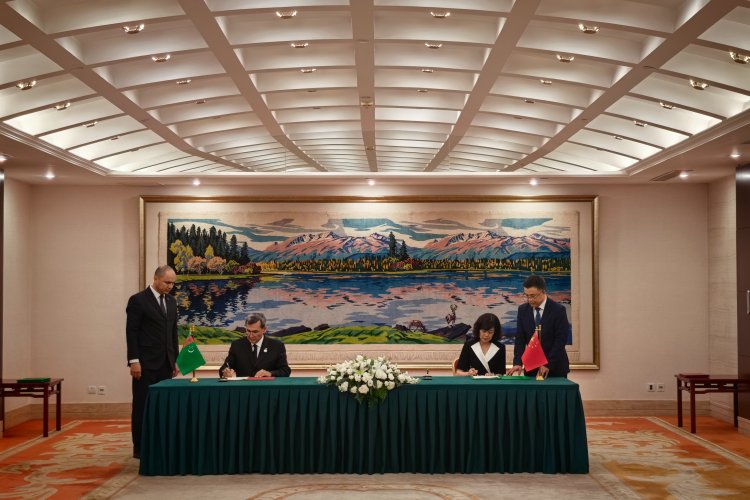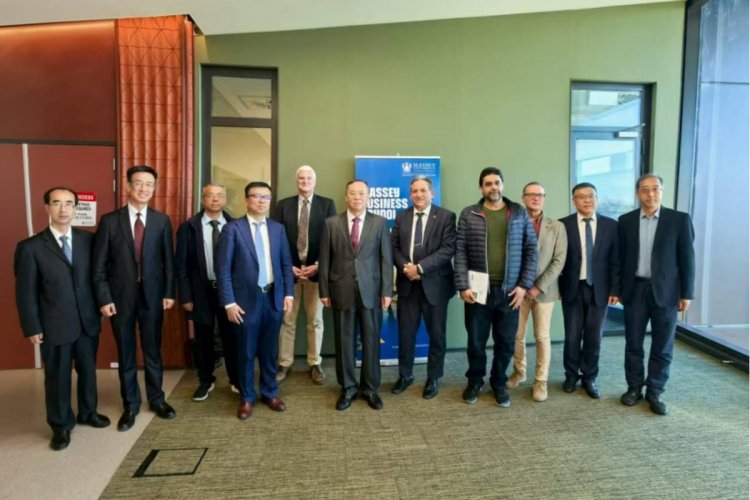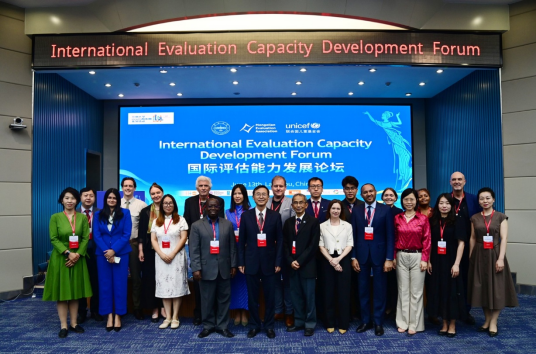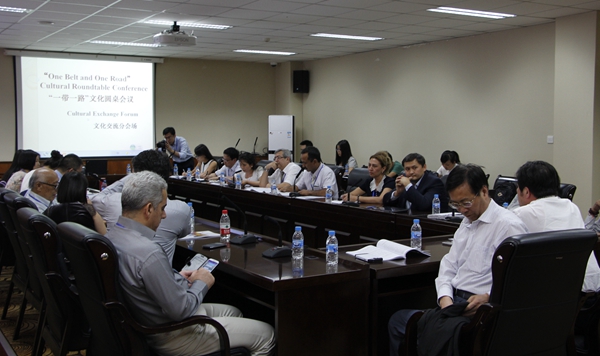
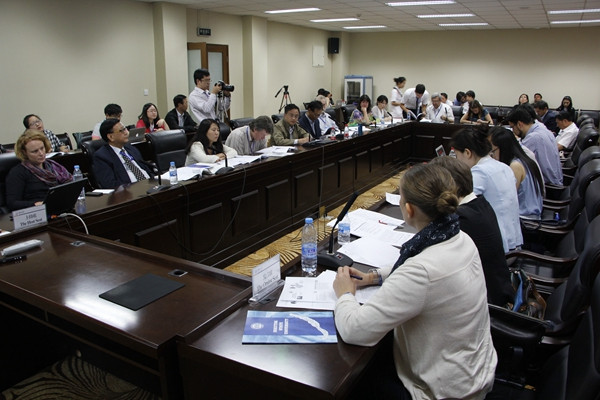
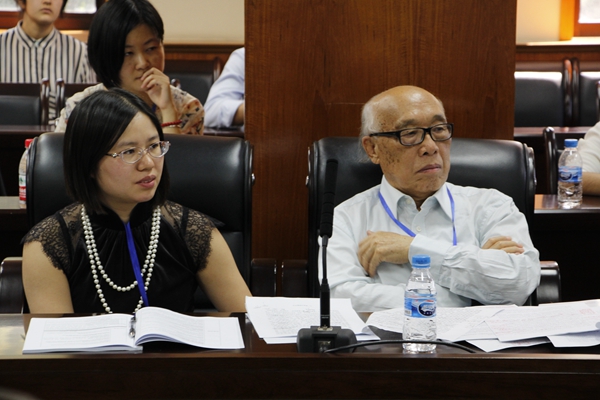
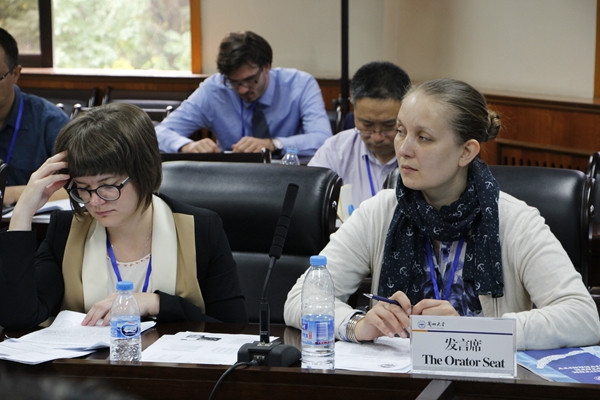
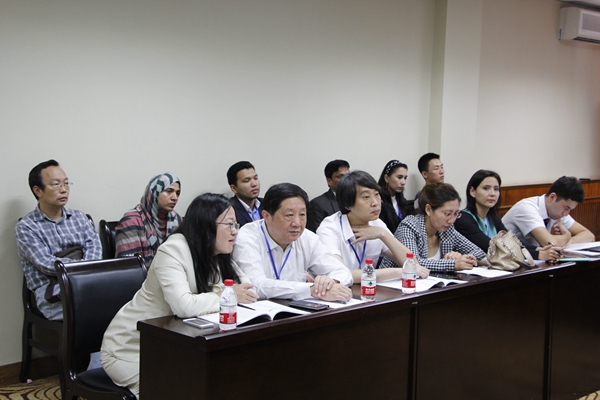
At 14:30 on August 24th, the “one belt one road” cultural roundtable conference---
“cultural exchange” roundtable was held in Room 201 in YifuHall of Science. Experts
and scholars from various countries such as China, Russia, India, Iran, Uzbekistan,
Germany gathered together to have in-depth exchanges and discussions in the
following five aspects, namely the Silk Road and civilization dialogue, the Silk Road
and cultural dissemination, the interaction and fusion of civilizations on the Silk
Road, the Silk Road and the religious development, and the art dissemination on the
Silk Road.
The first session of the “cultural exchange” roundtable was hosted by Prof. YovkochevShukhrat, dean of the School of International Politics, Tashkent East Research Institute. Prof. BekmuratovIsmatulla, dean of the Department of International Policy and History, Tashkent East Research Institute, delivered the first speech titled “China and Uzbekistan along the Silk Road”. He pointed out that China and Uzbekistan shared many similarities,which are the spirit and the great enterprise of the Silk Road. Then, Prof. Zhang Liwen, dean of Confucius Research Institue from
Renmin University of China, proposed the theme of “advocating harmony” and he
defined “harmony”as the notion of the conflicts and integrations between human and
nature, human and society, human body and heart, human and the world. In these
conflicts and integration, “harmony” would emerge as a brand-new living. Other
attendees took great interests in the notion of “harmony”. Prof. YovkochevShukhrat
questioned the origin of this concept and Prof. BekmuratovIsmatulla held exchanges
with Prof. Zhang Liwen about issues of Chinese religion and culture. Prof. Zhang’s
responses to those questions were full of humor and wisdom and aroused common
resonance among attendees.
The roundtable resumed after a short break and the second session was hosted by
Prof. BekmuratovIsmatulla. Mr. Sun Ruofeng, inspector and senior journalist of the
Department of Cultural Industry, Ministry of Culture, mentioned “two opportunities”
and “three integrations” and pointed out that the development of the Silk Road
cultural industry should take the cultural consumption demand of urban and rural
residents in China, Chinese urbanization and the integration of technology, capital
and the real economy into a comprehensive consideration. Afterwards, scholars from
Tashkent East Research Institute, Tashkent Confucius Institute and RenminUnivesity
of China delivered their speeches respectively. The protection and development of
the World Heritage on the Silk Road was of extensive concern. Prof. PengLanjia from
the School of Chinese Language and Literature, LZU, made a profound analysis of
the cross-border application, protection and reasonable development of the World
Heritage. Finally, Ms. Hao Qing, vice-president of Shanghai Sun3D Technology Co.,
and Mr. SayasatNurbeck, dean of Social Policy Research Institute of Kazakhstan’s
Ruling Party made their contrubutions to the exchanges about the cultural
construction of the Silk Road.
At 9:00 on August 25th, the “culture exchange” roundtable resumed again and was
hosted by Prof. Cheng Jincheng, dean of the School of Chinese Language and
Literature, LZU. In the beginning, Ms. Helga Zepp-LaRouche, chair of Fschiller
studies from Germany delivered a speech titled “The New Silk Road: the Foundation
of Peace in the 21st century”, in which she stressed that we shall not only focus on
the present but more for the future and thus we should make the full use the human
creativity and jointly seek a common peaceful world. Then, Prof. Jin Yuanpu from
Renmin University of China shared a new thinking of culture development of the Silk
Road from the perspective of adopting the internet-oriented thinking to promote the
Silk Road industry belt. Moreover, scholars from Russia and Prof. Jing Shuqin from
the School of Foreign Languages and Literatures, LZU delivered their speeches. Prof.
Zhou Jingbao from the School of Music, Xinjiang Normal Univerisity presented many
pictures to display various musical instruments on the Silk Road and shared his
opinion about culture and music.
After the tea break, Prof. Ding Shuqin hosted the roundtable. Scholars and experts
continued heated discussions. Dr. ArvindAlok, chair of Buddhist Site Development
Committee delivered a speech titled “India perspective on the culture and spirit”.
Adel Khnai from Iran proposed five suggestions based on his thoughts during the
conference. He suggested that we could issue the special Silk Road visa, establish
the visual Silk Road, develop high ways and railways along the Silk Road, revive the
Silk Road House as a free trade zone and hold annual cultural festivals for countries
along the Silk Road. In the end of his presentation, he sincerely invited all attendees
to participate the China-Iran culture festival in the next year. Finally, scholars from
Shanghai University of Finance and Economics and Irkutsk University presented their
speeches.
At noon on August 25th, the “culture exchange” roundtable was concluded with a
great success. Prof. Ding Shuqin said, “all the experts and scholars took an active
part in this conference and we hope there could be more platforms and more time
for us to share opinions and make exchanges.” The successful “culture exchange”
roundtable enabled scholars from every country to make consensus in the collision of
sparking ideas and they have lain a consolidate foundation for peaceful development, exchanges and mutual learning, cooperation and win-win situation among
countries and regions along the Silk Road.


